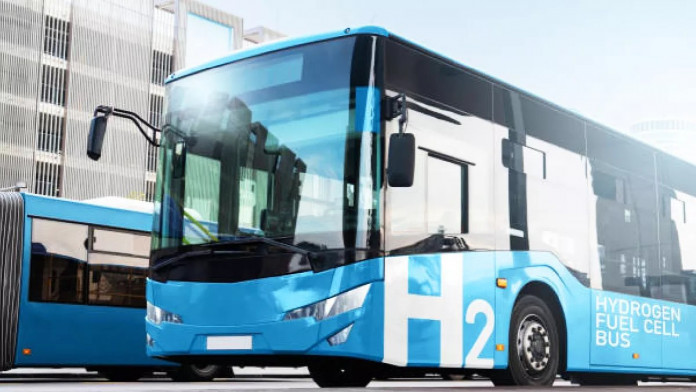Saudi Arabia is making a big step toward cleaner and greener urban transport. The city of Dammam is set to launch the kingdom’s very first public bus fleet powered by hydrogen fuel cells. This new fleet promises to change the way people travel in the city and shows Saudi Arabia’s growing commitment to clean energy solutions.
What Are Hydrogen-Powered Buses?
Hydrogen-powered buses run on hydrogen gas instead of traditional fuels like diesel or gasoline. Inside the bus, hydrogen combines with oxygen in a fuel cell to create electricity. This electricity powers the bus’s motor, making it run smoothly and quietly. The only byproduct of this process is water vapor, which means zero harmful emissions are released into the air.
This technology is important because it offers a clean alternative to the polluting fossil fuels currently used by most buses. Using hydrogen fuel cells helps reduce air pollution and combat climate change.
Why Dammam?
Dammam, one of Saudi Arabia’s largest cities and a major economic hub, was chosen for this clean energy pilot project for several reasons. The city has a growing population and busy roads, which means many people rely on public transport every day. Introducing hydrogen buses here will improve air quality and reduce noise pollution in crowded urban areas.
Furthermore, Dammam’s location makes it ideal for testing hydrogen technology. The city’s industrial background and proximity to other Gulf Cooperation Council (GCC) countries provide a strong platform for expanding clean energy projects in the region.
The Fleet and Its Features
The new fleet will consist of several hydrogen-powered buses equipped with advanced technology to ensure safety, efficiency, and comfort. These buses can travel longer distances compared to electric buses because hydrogen fuel cells store more energy.
Passengers will notice that the buses operate very quietly and produce no smoke or bad smells. This will improve the overall travel experience and make public transport more attractive to residents and visitors alike.
The buses are also designed to recharge quickly. Refueling with hydrogen takes only a few minutes, much faster than charging electric batteries. This means buses can spend more time on the road and less time at refueling stations.
Environmental Impact
The launch of hydrogen-powered buses aligns with Saudi Arabia’s Vision 2030 goals, which emphasize sustainable development and environmental protection. The transportation sector is a significant source of pollution, and switching to clean energy vehicles like these buses is a key step toward reducing the kingdom’s carbon footprint.
Hydrogen buses produce zero greenhouse gas emissions during operation, unlike diesel buses that emit large amounts of carbon dioxide and other harmful gases. By replacing diesel buses with hydrogen ones, Dammam can reduce air pollution, improve public health, and support global efforts to fight climate change.
Supporting Saudi Arabia’s Clean Energy Plans
Saudi Arabia has been investing heavily in renewable energy projects in recent years. While the country is known for its oil reserves, it is also working hard to diversify its energy mix and become a global leader in clean energy technologies.
The hydrogen bus project in Dammam is part of a broader national plan to promote hydrogen fuel as a clean and sustainable energy source. The government has announced several initiatives to develop hydrogen production, storage, and distribution infrastructure across the country.
Launching this hydrogen bus fleet will serve as a practical example of how hydrogen technology can be used in everyday life. It will also help create local jobs and encourage more research and innovation in the clean energy sector.
Challenges and Future Plans
Though hydrogen fuel cell technology offers many benefits, it also faces some challenges. Producing hydrogen requires energy, and currently, most hydrogen is made using fossil fuels. To make hydrogen truly green, it must be produced using renewable energy sources like solar or wind power.
Saudi Arabia is aware of this challenge and is investing in green hydrogen projects that use solar energy from the kingdom’s abundant sunshine. These projects will help produce clean hydrogen at a large scale in the future.
In the meantime, the hydrogen bus fleet in Dammam is a key first step. If successful, the project could expand to other cities in Saudi Arabia, helping to build a national network of clean and sustainable public transport.
What This Means for Residents
For people living in Dammam, the arrival of hydrogen-powered buses means cleaner air and a quieter city. It also offers a modern and efficient public transportation option that supports the country’s environmental goals.
As more hydrogen buses hit the roads, residents may feel more encouraged to use public transit instead of personal cars. This shift can help reduce traffic congestion and lower pollution levels even further.
The project also highlights Saudi Arabia’s willingness to embrace new technologies and invest in a sustainable future. It sends a positive message to the world about the kingdom’s commitment to protecting the environment while improving the quality of life for its citizens.
Conclusion
The launch of Saudi Arabia’s first hydrogen-powered public bus fleet in Dammam is a landmark moment for clean energy and urban transport in the kingdom. These buses offer a promising solution to reduce pollution and support sustainable development.
As the project progresses, it could inspire other cities and countries in the region to explore hydrogen technology and accelerate the shift toward greener, cleaner transport systems.
Also read: Israeli Court Slaps Gag Order on Netanyahu Aides’ Qatar Scandal



